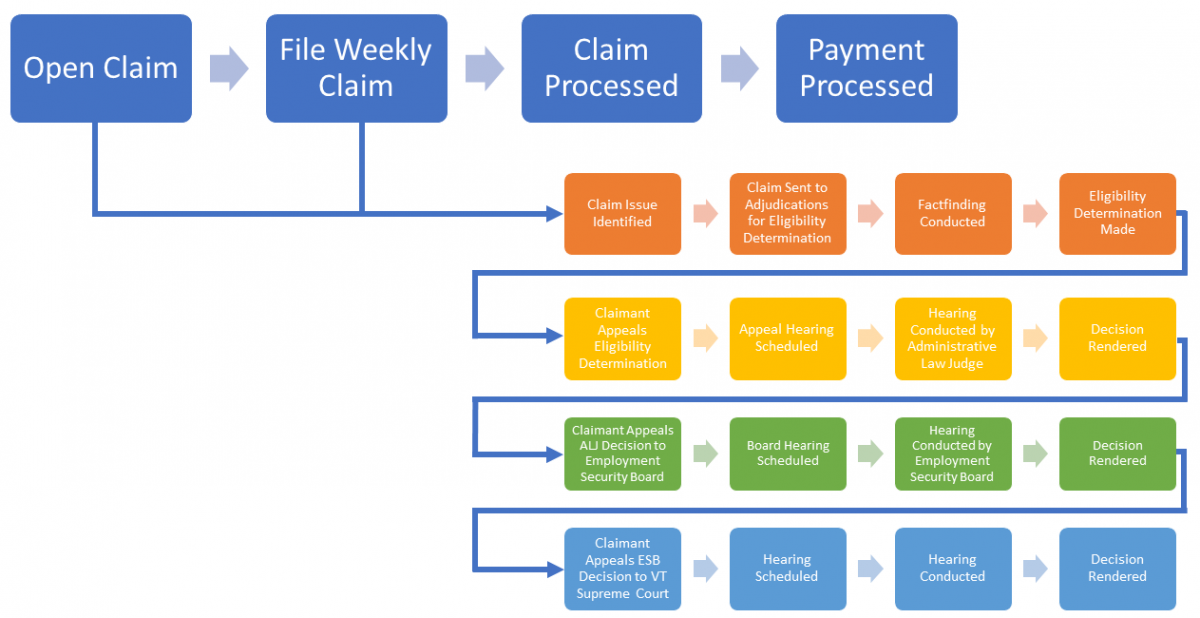Please be aware that the average time from a claim being established to receiving a fully-adjudicated eligibility determination can typically take between 60-90 days. The adjudications process requires detailed fact-finding and can include information provided by both the claimant, as well as the separating employer. Claims are adjudicated in the order in which they are received, and claimants should expect to hear from a fact-finder/adjudicator if more information is required in order to make a fair and impartial determination. Final determinations are mailed to all interested parties via the U.S. Postal Service. All eligibility determinations come with the right to appeal by either the claimant or the employer. Claimants should make sure to read fully the determination issued by the Department and the instructions for filing an appeal. Please be aware that the adjudication process is separate and apart from the unemployment insurance benefits program and customer representatives within the UI Claimant Assistance Center do not have access to adjudication information.
Complete information regarding unemployment insurance determinations and the adjudication process can be found beginning on page 12 of the UI Claimant Handbook.
Anytime a claimant files an Initial Claim or a Weekly Claim, the possibility exists for an "issue" to be created on the claim. Any time a claim "issue" is created, the claim must be adjudicated to determine the most appropriate resolution for the claim. Issues are created any time information provided on a claim conflicts with either the eligibility requirements of the UI program or if the information provided by the claimant conflicts with that of the seperating employer.
- Claimant voluntarily quit employment
- Claimant was discharged from employment for misconduct
- Claimant indicated they were not able and available for work
- Claimant indicated that they refused suitable work that was offered to them
- Claimant failed to report offsetting remuneration such as vacation pay, severance pay, workers' compensation, etc.
- Claimant reports receiving additional compensation at the time of separation (e.g., vacation pay, severance pay, etc.). This information must then be validated by the separating employer.
- Claimant files untimely or submits a backdating request
- Separating employer provides additional information to the Department that conflicts with the information provided by the claimant
When you establish an initial claim for benefits, the Department must make several initial decisions about whether or not you are entitled to receive unemployment benefits.
The Department will determine if you have sufficient wages to qualify for a weekly benefit amount. You will receive a “Monetary Determination” that explains the wages used to determine whether you have been paid enough wages to qualify for a weekly benefit amount and what that amount will be. This will list the employers you have worked for and the wages reported under your SSN during the base period. If information is missing, such as wages from another state or wages from a Vermont employer, you will receive additional monetary redeterminations, as the Department obtains this information. If you did not work for any employers indicated on this notice or if the wage amounts are incorrect or missing, contact Claimant Assistance.
The Department will determine if you meet the basic eligibility requirements for benefits, such as ability and availability for work. This will create an “issue” on your claim and require you to go through the adjudication process.
The Department will determine if there is anything regarding your separation from employment that would create an “issue” on your claim, such as a voluntary quit, a discharge, a medical separation, or separation pay. This may create an “issue” on your claim and require you to go through the adjudication process
If an issue is created on the claim, your information will be sent to the Adjudications Unit and a notice will be mailed to you indicating the time and date of a fact-finding interview, if necessary. This is your only opportunity to discuss your situation with a claims adjudicator. If you miss the fact-finding interview, the adjudicator will render the determination based on available information and mail it to you. This determination will explain whether you have been found eligible to receive benefits or not.
If you quit a job for personal reasons not attributable to the employer you may be disqualifed from receiving benefits until you have started new employment, earned six times your weekly benefit amount, and become unemployed through no fault of your own.
If you were fired for misconduct the standard disqualification of 10 weeks is usually imposed. In addition, a cap on the maximum number of weeks to be claimed in a benefit year will be imposed to not exceed 23 full weeks.If you were fired for gross misconduct you may be disqualified from receiving benefits until you have started new employment, earned six times your weekly benefit amount, and become unemployed through no fault of your own. Separation for gross misconduct will prohibit the use of wages earned from the separating employer for calculation of your weekly benefit amount for current and future claims.
Separation pay, such as vacation pay, wages in lieu of notice, paid time off, or severance pay, may disqualify you or result in a reduction of benefits for one or more weeks. During the fact-finding process benefits will not be paid, unless the claimant is in a continuously filing status at the time the issue is detected. You must continue to file your weekly claim(s) during the fact-finding process in order to be considered for payments for such weeks.

